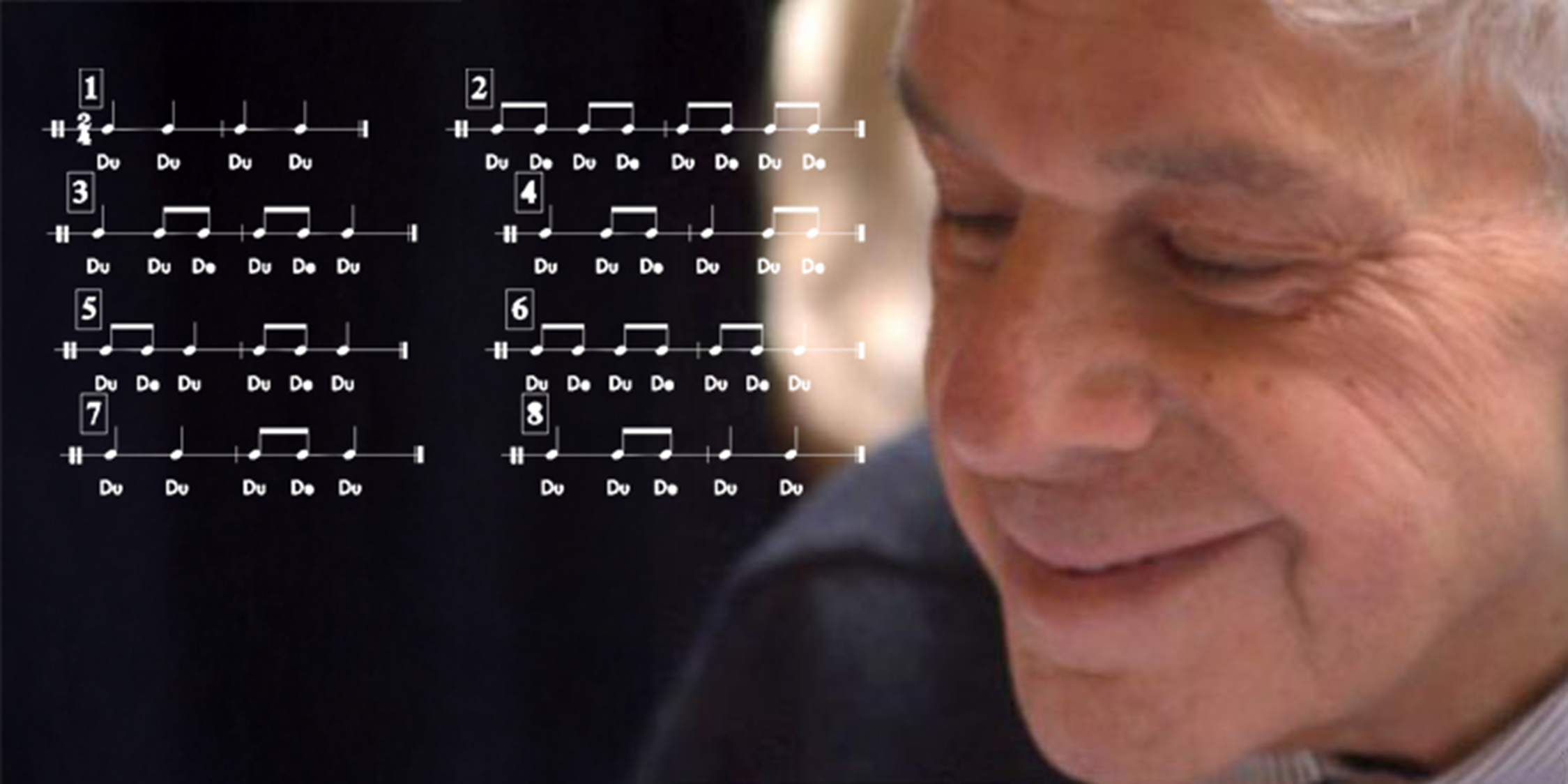When most students dream of a music degree, they picture grand stages, packed concert halls, and years of honing performance skills. But there's another pathway—one that dives deep into the why and how of music learning. Welcome to the world of music cognition and Music Learning Theory (MLT), a growing field at the intersection of psychology, neuroscience, and music education. At the heart of this movement is the legacy of Dr. Edwin E. Gordon (1927–2015), a world-renowned music researcher whose work changed the way we understand musical development.
Have you ever learned a song by ear before you ever saw the notes on a page? Or felt a rhythm in your bones before you knew its name? That spark—the inner hearing of music—is what Dr. Edwin E. Gordon spent his life studying. His groundbreaking research in music cognition and Music Learning Theory (MLT) opened doors for music educators worldwide, changing how we understand and teach musical development.
What Is Music Cognition?
It’s the study of how we think, hear, and understand music—kind of like music psychology. It helps teachers understand how students learn music, not just how to play it.
Today, Gordon’s ideas are changing how music is taught in classrooms across the U.S. And if you’re thinking about becoming a music teacher, learning his approach can give you a real advantage.
Fast Facts About Edwin Gordon
- Jazz Roots: Began as a professional jazz bassist before becoming a researcher.
- Eastman School: Early work included the "Eastman System of Rhythmic Counting," inspired by his performance background.
- Audiation Pioneer: Coined and developed the concept of audiation—the ability to hear music in your mind even without sound.
- Global Influence: His Music Learning Theory has shaped classrooms around the world, even where it’s not mentioned by name.
- Legacy: The Edwin E. Gordon Archive is housed at the University of South Carolina.
Who Was Edwin Gordon?
Edwin Gordon was a jazz bassist turned music researcher and educator. His background as a performer—especially in jazz—sparked his curiosity about how people learn and think musically. Early in his career, while teaching and researching at the Eastman School of Music, his rhythmic counting approach became informally known as the Eastman System of Rhythmic Counting, laying the foundation for his later theories. Over decades of research, Gordon developed Music Learning Theory, a science-based approach built on the concept of audiation—the ability to hear and comprehend music in your mind even when no sound is present.
His studies revealed that music aptitude develops most rapidly in early childhood and that structured, sequential learning can unlock every student’s potential for musical growth. Many modern music classrooms use Gordon-inspired techniques, sometimes without explicitly naming them. If your teacher encourages audiation, uses pattern instruction instead of rote memorization, or focuses on developing inner hearing skills, you may already be experiencing Gordon’s techniques in action.
How to Know If Your Teacher Uses the Gordon Technique
Not every teacher who uses Gordon's methods advertises it as “Music Learning Theory.” However, you might notice:
- Learning tonal and rhythm patterns by ear before seeing notation.
- Activities that ask you to audiate or silently “hear” music before performing it.
- Sequential lessons designed to develop true understanding of musical structure, not just playing notes.
As a future music educator, understanding Gordon’s research gives you the tools to recognize and apply effective, science-backed teaching methods.
University of South Carolina: A Hub for Gordon's Legacy
The University of South Carolina (USC) stands out as a major center for Gordon’s work. It is home to the Edwin E. Gordon Archive, preserving his original studies, writings, and recordings. USC also partners closely with the Gordon Institute for Music Learning (GIML), hosting certification courses and training events that allow educators to study Music Learning Theory in depth. While many schools incorporate Gordon-based approaches, USC remains a uniquely rich environment for students who want direct access to his research and the experts continuing his work today.
How to Train in MLT and Music Cognition
If you’re planning to become a music educator, your main major will typically be Music Education. But some universities offer opportunities to go further:
- Add a Certificate in MLT: A valuable extra credential that proves your understanding of how students learn music.
- Double Major in Music Cognition (available at select schools): For those who want to combine music education and music psychology.
- Take Cognitive Science Courses: Great if you’re also interested in how the brain works.
Whether through electives, minors, or research opportunities, there are many ways to integrate this specialized training into your college experience.
Quick Take: Why MLT Could Help You Get Hired
- Stand Out: Principals notice teachers who understand student learning.
- Connect Better: MLT helps you reach all types of learners.
- Build Musicianship: Go beyond reading notes—teach students to think musically.
- Boost Your Résumé: A certificate in Gordon’s MLT shows serious commitment
For Students Interested in Psychology or Neuroscience
Music cognition isn’t just for future music teachers—it also appeals to students who are curious about how the brain works. If you're considering a path in psychology, neuroscience, or cognitive science, exploring music cognition can give you a unique interdisciplinary edge.
Some universities allow you to double major in music education and cognitive science or psychology, while others offer electives or research opportunities that link the two fields.
Studying how we process sound, memory, rhythm, and emotion through music can give you deeper insight into both your musical ability and how the human brain functions. If you love both music and the mind, this could be your sweet spot.
Other U.S. Universities Offering Strong Music Cognition Programs
While USC is deeply connected to Gordon’s legacy, other American institutions also provide strong opportunities in music cognition and learning theory:
- Northwestern University (Bienen School of Music): Offers a Bachelor of Music in Music Cognition and a PhD in Music Theory and Cognition, combining neuroscience, psychology, and music studies.
- University at Buffalo (SUNY UB): All music education degrees are grounded in Music Learning Theory, with the nation’s only online Advanced Certificate in MLT.
- University of Rochester / Eastman School of Music: Features an undergraduate track in Music Cognition and Language, exploring how the brain processes musical information and maintaining ties to Gordon’s early research roots.
- University of Hartford: Includes graduate coursework in Edwin Gordon’s Music Learning Theory, preparing educators to apply audiation principles in schools.
Why This Matters to Future Music Educators
- Understanding How Students Learn: Gordon’s research gives future teachers insight into how musical ability grows and how to nurture it effectively.
- Research-Driven Teaching: Learn methods backed by decades of scientific study, not just tradition.
- Expanded Career Paths: Move beyond performance and explore music education research, curriculum design, music therapy, and cognitive science.
- Access to Gordon’s Legacy: Programs like USC’s offer unparalleled access to Gordon’s archives and training resources while other schools offer complementary approaches to music cognition.
In Conclusion
Understanding how music is learned—not just performed—can set you apart as a future educator. If you’re serious about shaping the next generation of musicians, Music Learning Theory (MLT) and Music Cognition offer tools that empower you to teach with purpose, depth, and creativity.
Whether you pursue a certificate, a double major, or simply explore these ideas in your undergraduate coursework, you’ll be equipped with the kind of knowledge that resonates with school districts looking for leaders—not just lesson planners.
And if you’re drawn to schools that are shaping the future of music education, the University of South Carolina—and others like it—can help you start that journey today.
Academic & Professional References
Books by Edwin E. Gordon
- Gordon, E. E. (1997). Learning Sequences in Music: Skill, Content, and Patterns. GIA Publications.
- Gordon, E. E. (1999). All About Audiation and Music Aptitudes. GIA Publications.
- Gordon, E. E. (2003). A Music Learning Theory for Newborn and Young Children. GIA Publications.
- Gordon, E. E. (2007). Clarity by Comparison and Relationship: A Bedtime Reader for Music Educators. GIA Publications.
Peer-Reviewed Articles
- Valerio, W. H., Reynolds, A. M., Bolton, B. M., Taggart, C. C., & Gordon, E. E. (1998). Music Play: The Early Childhood Music Curriculum Guide for Parents, Teachers, and Caregivers. GIA Publications.
- Madsen, C. K., & Geringer, J. M. (2008). “Music cognition: Science and technology.” Update: Applications of Research in Music Education, 27(1), 15–23.
Music Cognition Journals
- Large, E. W., & Palmer, C. (2002). “Perceiving temporal regularity in music.” Cognitive Science, 26(1), 1–37.
- Patel, A. D. (2008). Music, Language, and the Brain. Oxford University Press.
Theses & Dissertations
Doctoral Dissertations:
- Flores, M. C. (2016). The Effect of Music Learning Theory-Based Instruction on the Tonal Pattern Performance and Audiation Skills of Elementary Students. University of South Carolina. [Doctoral Dissertation]
- Grimsley, R. (2009). An Evaluation of Music Learning Theory-Based Curriculum in an Elementary General Music Program. Boston University. [Doctoral Dissertation]
- Smith, K. L. (2014). Teaching Rhythm: A Comparison of the Eastman System and Gordon’s Rhythm Learning Sequence. University of Kansas. [DMA Dissertation]
- Taylor, R. (2018). Early Childhood Audiation Development and the Application of Gordon’s Music Learning Theory. University of Hartford. [Master’s Thesis]
- Nguyen, L. (2015). An Exploration of Audiation and Inner Hearing in Secondary Music Classrooms. Northwestern University. [Master’s Thesis]
Suggested Reading
- Gordon, Edwin E. Learning Sequences in Music: Skill, Content, and Patterns
- Valerio, Wendy H., et al. Music Play: The Early Childhood Music Curriculum Guide
- Patel, Aniruddh D. Music, Language, and the Brain
- Campbell, Patricia Shehan. Teaching Music Globally
- Taylor, Rachel. Early Childhood Audiation Development and the Application of Gordon’s Music Learning Theory (Master’s Thesis)
- Gordon, Edwin E. A Music Learning Theory for Newborn and Young Children
- Gordon Institute for Music Learning (GIML) – https://giml.org
- Flores, Melissa C. The Effect of MLT-Based Instruction on Audiation Skills of Elementary Students (Doctoral Dissertation)
- “What Is Audiation?” (GIML Blog Post)
- Sousa, David A. How the Brain Learns


.png) ARTICLE GLOSSARY
ARTICLE GLOSSARY

.png)
.png)


.jpg)
.jpg)

.jpg)

.png)




.jpg)
.png)










.jpg)



.jpg)
.jpg)
.jpg)
.jpg)
.jpg)

.png)
.png)

